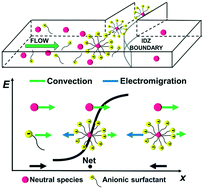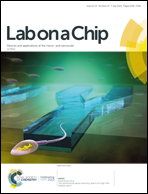Continuous micellar electrokinetic focusing of neutral species driven by ion concentration polarization†
Abstract
Ion concentration polarization (ICP) has been broadly applied to accomplish electrokinetic focusing of charged species. However, ICP-based extraction and enrichment of uncharged (neutral) compounds, important for pharmaceutical, biological, and environmental applications, has not yet been reported. Here, we report the ICP-based continuous extraction of two neutral compounds from aqueous solution, by their partition into an ionic micellar phase. Our initial results show that the efficiency of the extraction increases with the concentration of the surfactant comprising the micellar phase, reaching 98 ± 2%, and drops precipitously when the concentration of the target compound exceeds the capacity of the micelles. As a key feature relevant to the practical application of this method, we show that focusing occurs even an order of magnitude below the critical micelle concentration through the local enrichment and assembly of surfactants into micelles, thus minimizing their consumption. To underscore the relevance of this approach to water purification, this method is applied to the extraction of pyrene, a model for polyaromatic hydrocarbons. This approach provides access to a broad range of strategies for selective separation that have been developed in micellar electrokinetic chromatography.



 Please wait while we load your content...
Please wait while we load your content...